UVM Libraries are celebrating Black History Month with our New Books Spotlight! Our latest Spotlight follows us out of February and into March with our newest books on Black farming, food, and families; a list curated in the lens of health equity. Visit the Howe Library Lobby to see our “Black Farming, Food, and Families” display for more books like these! Also stop by the Dana Health Sciences Library to see the National Library of Medicine’s traveling exhibition “Making a World of Difference: Stories About Global Health”.
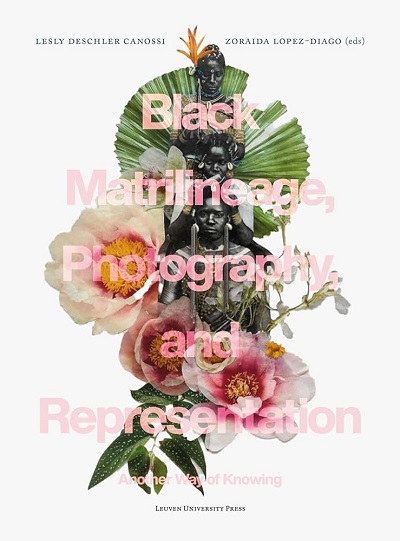
eBook
“Black Matrilineage, Photography, and Representation questions how the Black female body, specifically the Black maternal body, navigates interlocking structures that place a false narrative on her body and that of her maternal ancestors. Drawing on a wide range of scholarly inquiry and contemporary art, this book addresses these misconceptions and fills in the gaps that exist in the photographic representation of Black motherhood, mothering, and mutual care within Black communities. The essays and interviews, paired with a curated selection of images, address the complicated relationship between Blackness and photography and in particular its gendered dimension, its relationship to health, sexuality, and digital culture -- primarily in the context of racialized heteronormativity. This collection, then, challenges racist images and discourses, both historically and in its persistence in contemporary society, while reclaiming the innate brilliance of Black women through personal stories, history, political acts, connections to place, moments of pleasure, and communal celebration. This visual exploration of Black motherhood through pictures made by Black woman--identifying photographers thus serves as a reflection of the past and a portal to the future and contributes to recent scholarship on the complexity of Black life and Black joy. This book emerges from the project Women Picturing Revolution.”
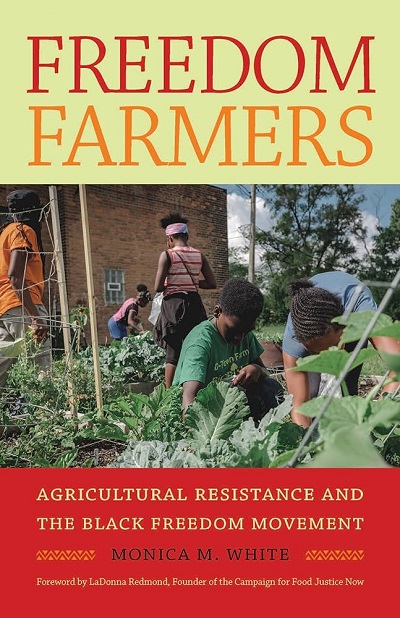
Freedom farmers agricultural resistance and the black freedom movement by Monica M. White
eBook
"Expands the historical narrative of the black freedom struggle to embrace the work, roles, and contributions of southern black farmers and the organizations they formed. Whereas existing scholarship generally views agriculture as a site of oppression and exploitation of black people, this book reveals agriculture as a site of resistance and provides a historical foundation that adds meaning and context to current conversations around the resurgence of food justice/sovereignty movements in urban spaces like Detroit, Chicago, Milwaukee, New York City, and New Orleans."
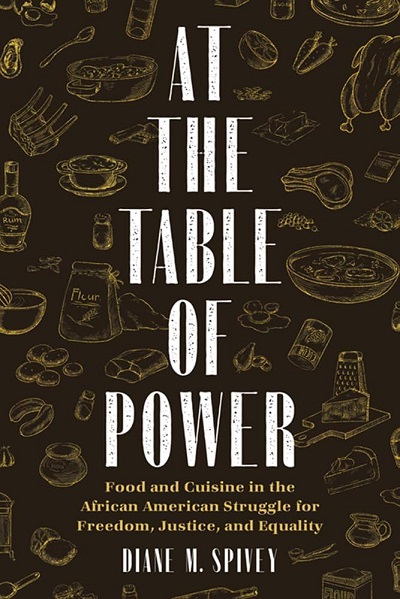
At the table of power : food and cuisine in the African American struggle for freedom, justice, and equality by Diane M. Spivey
Print Book
"At the Table of Power is both a cookbook and a culinary history that intertwines social issues, personal stories, and political commentary. Renowned culinary historian Diane M. Spivey offers a unique insight into the historical experience and cultural values of African America and America in general by way of the kitchen. From the rural country kitchen and steamboat floating palaces to marketplace street vendors and restaurants in urban hubs of business and finance, Africans in America cooked their way to positions of distinct superiority, and thereby indispensability. Despite their many culinary accomplishments, most Black culinary artists have been made invisible--until now. Within these pages, Spivey tells a powerful story beckoning and daring the reader to witness this culinary, cultural, and political journey taken hand in hand with the fight of Africans in America during the foundation years, from colonial slavery through the Reconstruction era. These narratives, together with the recipes from the nineteenth and twentieth centuries, expose the politics of the day and offer insight on the politics of today. African American culinary artists, Spivey concludes, have more than earned a rightful place at the table of culinary contribution and power."
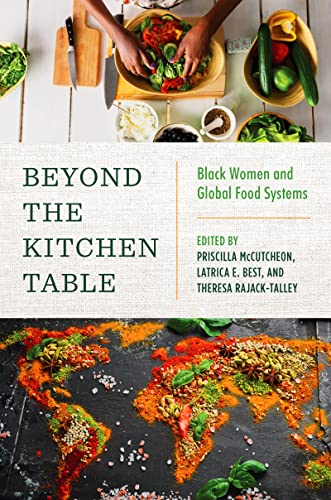
Print Book
"Over the last decade, there has been an increasing amount of scholarship focused on race and food inequity. Much of this research is focused on the United States and its densely populated urban centers. Looking deeply into Black women's roles-economically, environmentally, and socially-in food and agriculture systems in the Caribbean, Africa, and the United States, the contributors address the ways Black women, both now and in the past, have used food as a part of community building and sustenance. Contributors include Agnes Atia Apusigah, Neela Badrie, Kenia-Rosa Campo, Dara Cooper, Kelsey Emard, Claudia J. Ford, Hanna Garth, Shelene Gomes, Veronica Gordon, Wendy-Ann Isaac, Lydia Kwoyiga, Gloria Sanders McCutcheon, Eveline M. F. W. Sawadogo/Compaore, Ashanté M. Reese, Sakiko Shiratori, shakara tyler, and Marquitta Webb."
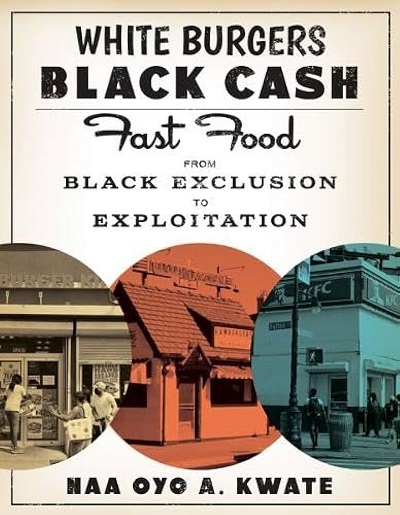
White burgers, Black cash : fast food from Black exclusion to exploitation by Naa Oyo A. Kwate
Print Book
"White Burgers, Black Cash traces the evolution in fast food from the early 1900s to the present, from its long history of racist exclusion to its current damaging embrace of urban Black communities. Deeply researched, compellingly told, and brimming with surprising details, this book reveals the inequalities embedded in America's popular national food tradition."

Emma's postcard album : Black lives in the early twentieth century by Faith Mitchell
Print Book
"The turn of the twentieth century was an extraordinarily difficult period for African Americans, a time of unchecked lynchings, mob attacks, and rampant Jim Crow segregation. During these bleak years, Emma Crawford, a young African American woman living in Pennsylvania, corresponded by postcard with friends and family members and collected the cards she received from all over the country. Her album-spanning from 1906 to 1910 and analyzed in Emma's Postcard Album-becomes an entry point into a deeply textured understanding of the nuances and complexities of African American lives and the survival strategies that enabled people "to make a way from no way." As snippets of lived experience, eye-catching visual images, and reflections of historical moments, the cards in the collection become sources for understanding not only African American life, but also broader American history and culture. In Emma's Postcard Album, Faith Mitchell innovatively places the contents of this postcard collection into specific historic and biographical contexts and provides a new interpretation of postcards as life writings, a much-neglected aspect of scholarship. Through these techniques, a riveting world we know far too little about is revealed, and we gain new insights into the perspectives and experience of African Americans-in their own words. Capping off these contributions, the text is a visual feast, illustrated with arresting images from the Golden Age of postcards as well as newspaper clippings and other archival material."

Romare Bearden in the homeland of his imagination : an artist's reckoning with the South by Glenda Elizabeth Gilmore
Print Book
"Romare Bearden (1911-1988), one of the most prolific, original, and acclaimed American artists of the twentieth century, richly depicted scenes and figures rooted in the American South and the Black experience. Bearden hailed from North Carolina but was forced to relocate to the North when a white mob harassed [his family] in the 1910s. His family story is a compelling, complicated saga of Black middle-class achievement in the face of relentless waves of white supremacy. It is also a narrative of the generational trauma that slavery and racism inflicted over decades. But as Glenda Gilmore reveals in this trenchant reappraisal of Bearden's life and art, his work reveals his deep imagination, extensive training and rich knowledge of art history."
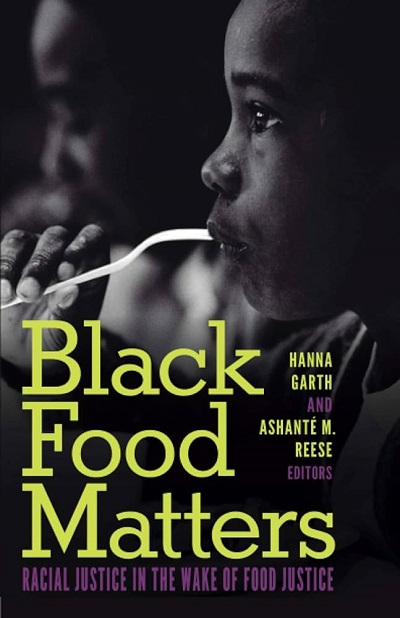
eBook & Print Book
"An in-depth look at Black food and the challenges it faces today."
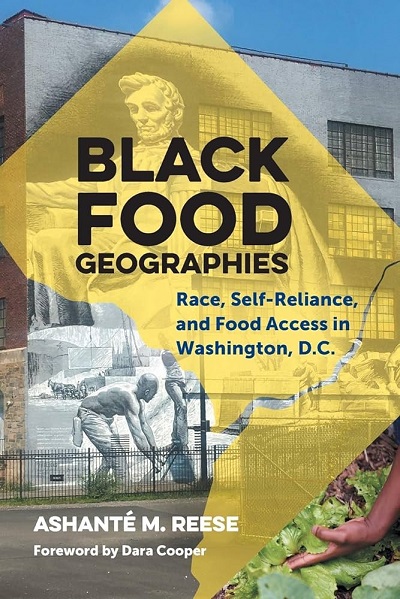
Black food geographies : race, self-reliance, and food access in Washington, D.C. by Ashanté M. Reese
eBook & Print Book
“In this book, Ashante M. Reese makes clear the structural forces that determine food access in urban areas, highlighting Black residents' navigation of and resistance to unequal food distribution systems. Linking these local food issues to the national problem of systemic racism, Reese examines the history of the majority-Black Deanwood neighborhood of Washington, D.C. Based on extensive ethnographic fieldwork, Reese not only documents racism and residential segregation in the nation's capital but also tracks the ways transnational food corporations have shaped food availability. By connecting community members' stories to the larger issues of racism and gentrification, Reese shows there are hundreds of Deanwoods across the country. Reese's geographies of self-reliance offer an alternative to models that depict Black residents as lacking agency.”
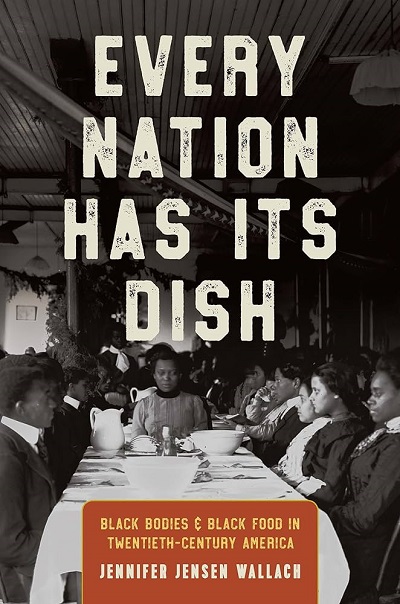
Every Nation Has Its Dish Black Bodies and Black Food in Twentieth-Century America by Jennifer Jensen Wallach
eBook & Print Book
“This text gives a nuanced history of black foodways across the twentieth century, challenging traditional narratives of 'soul food' as a singular style of historical African American cuisine. It details the experiences and diverse convictions of several generations of African American activists, ranging from Booker T. Washington and W.E.B. Du Bois to Mary Church Terrell, Elijah Muhammad, and Dick Gregory.”
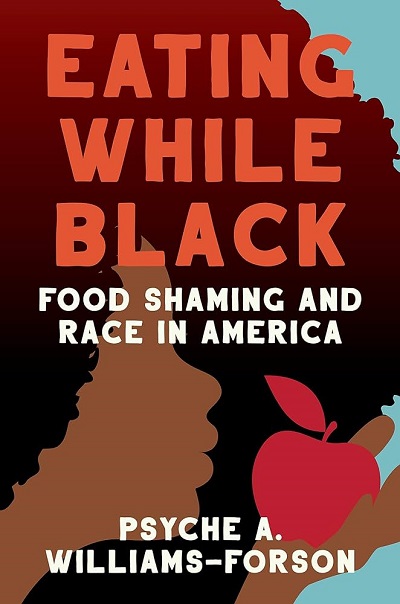
Eating while Black : food shaming and race in America by Psyche A. Williams-Forson
Print Book
"Psyche A. Williams-Forson is one of our leading thinkers about food in America. In Eating While Black, she offers her knowledge and experience to illuminate how anti-Black racism operates in the practice and culture of eating. She shows how mass media, nutrition science, economics, and public policy drive entrenched opinions among both Black and non-Black Americans about what is healthful and right to eat. Distorted views of how and what Black people eat are pervasive, bolstering the belief that they must be corrected and regulated. What is at stake is nothing less than whether Americans can learn to embrace nonracist understandings and practices in relation to food."
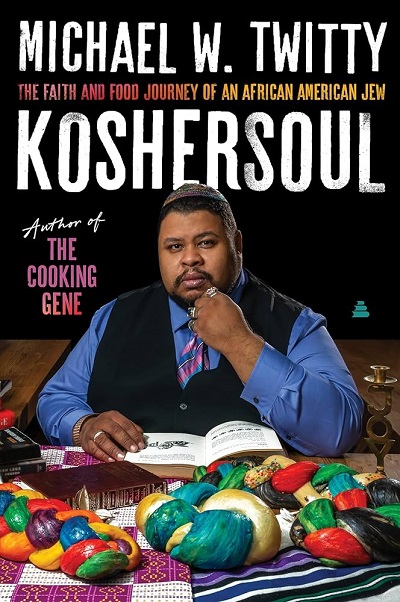
Koshersoul : the faith and food journey of an African American Jew by Michael W. Twitty
Print Book
"The James Beard award-winning author of the acclaimed The Cooking Gene explores the cultural crossroads of Jewish and African diaspora cuisine and issues of memory, identity, and food. In Koshersoul, Michael W. Twitty considers the marriage of two of the most distinctive culinary cultures in the world today: the foods and traditions of the African Atlantic and the global Jewish diaspora. To Twitty, the creation of African-Jewish cooking is a conversation of migrations and a dialogue of diasporas offering a rich background for inventive recipes and the people who create them. The question that most intrigues him is not just who makes the food, but how the food makes the people. Jews of Color are not outliers, Twitty contends, but significant and meaningful cultural creators in both Black and Jewish civilizations. Koshersoul also explores how food has shaped the journeys of numerous cooks, including Twitty's own passage to and within Judaism. As intimate, thought-provoking, and profound as The Cooking Gene, this remarkable book teases the senses as it offers sustenance for the soul. Koshersoul includes 48-50 recipes."
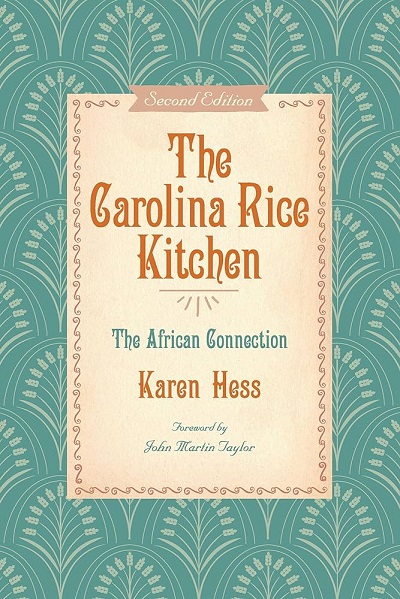
The Carolina rice kitchen the African connection by Karen Hess
eBook
“A pioneering history of the Carolina rice kitchen and its African influences Where did rice originate? How did the name Hoppin' John evolve? Why was the famous rice called "Carolina Gold"? The rice kitchen of early Carolina was the result of a myriad of influences--Persian, Arab, French, English, African--but it was primarily the creation of enslaved African American cooks. And it evolved around the use of Carolina Gold. Although rice had not previously been a staple of the European plantation owners, it began to appear on the table every day. Rice became revered and was eaten at virtually every meal and in dishes that were part of every course: soups, entrées, side dishes, dessert, and breads. The ancient way of cooking rice, developed in India and Africa, became the Carolina way. Carolina Gold rice was so esteemed that its very name became a generic term in much of the world for the finest long-grain rice available. This engaging book is packed with fascinating historical details, including more than three hundred recipes and a facsimile of the Carolina Rice Cook Book from 1901. A new foreword by John Martin Taylor underscores Hess's legacy as a culinary historian and the successful revival of Carolina Gold rice.”
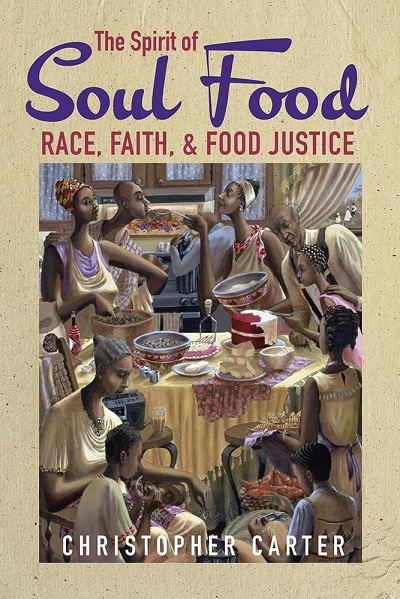
The spirit of soul food : race, faith, and food justice by Christopher Carter
eBook
“Soul food has played a critical role in preserving Black history, community, and culinary genius. It is also a response to - and marker of - centuries of food injustice. Given the harm that our food production system inflicts upon Black people, what should soul food look like today? Christopher Carter's answer to that question merges a history of Black American foodways with a Christian ethical response to food injustice. Carter reveals how racism and colonialism have long steered the development of US food policy. The very food we grow, distribute, and eat disproportionately harms Black people specifically and people of colour among the global poor in general. Carter reflects on how people of colour can eat in a way that reflects their cultural identities while remaining true to the principles of compassion, love, justice, and solidarity with the marginalised.”
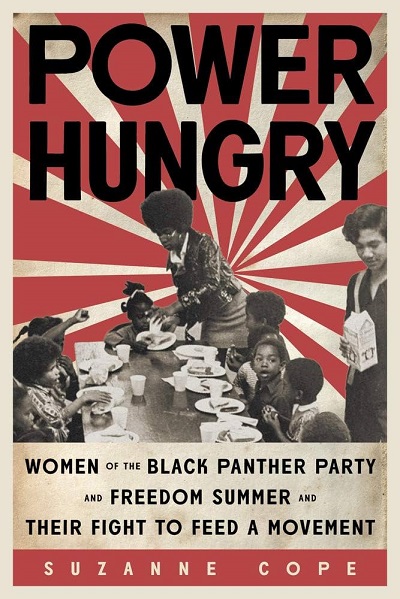
Power hungry women of the Black Panther Party and Freedom Summer and their fight to feed a movement by Suzanne Cope
eBook
“Two unsung women whose power using food as a political weapon during the civil rights movement was so great it brought the ire of government agents working against them In early 1969 Cleo Silvers and a few Black Panther Party members met at a community center laden with boxes of donated food to cook for the neighborhood children. By the end of the year, the Black Panthers would be feeding more children daily in all of their breakfast programs than the state of California was at that time. More than a thousand miles away, Aylene Quin had spent the decade using her restaurant in McComb, Mississippi, to host secret planning meetings of civil rights leaders and organizations, feed the hungry, and cement herself as a community leader who could bring people together—physically and philosophically—over a meal. These two women's tales, separated by a handful of years, tell the same story: how food was used by women as a potent and necessary ideological tool in both the rural south and urban north to create lasting social and political change. The leadership of these women cooking and serving food in a safe space for their communities was so powerful, the FBI resorted to coordinated extensive and often illegal means to stop the efforts of these two women, and those using similar tactics, under COINTELPRO--turning a blind eye to the firebombing of the children of a restaurant owner, destroying food intended for poor kids, and declaring a community breakfast program a major threat to public safety. But of course, it was never just about the food.”
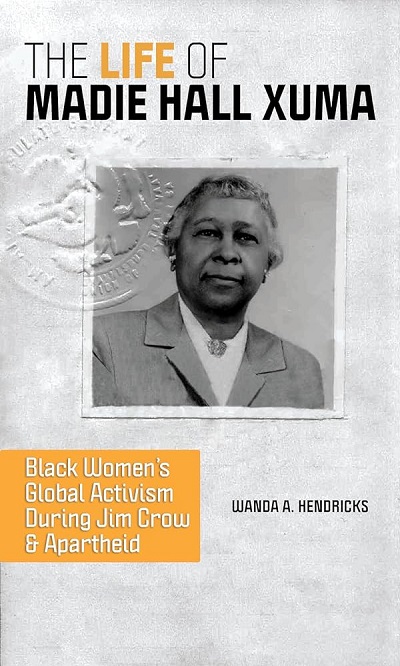
The life of Madie Hall Xuma : Black women's global activism during Jim Crow and apartheid by Wanda A. Hendricks
Print Book
"Revered in South Africa as "An African American Mother of the Nation," Madie Beatrice Hall Xuma spent her extraordinary life immersed in global women's activism. Wanda A. Hendricks's biography follows Hall Xuma from her upbringing in the Jim Crow South to her leadership role in the African National Congress (ANC) and beyond. Hall Xuma was already known for her social welfare work when she married South African physician and ANC activist Alfred Bitini Xuma. Becoming president of the ANC Women's League put Hall Xuma at the forefront of fighting racial discrimination as South Africa moved toward apartheid. Hendricks provides the long-overlooked context for the events that undergirded Hall Xuma's life and work. As she shows, a confluence of history, ideas, and organizations both shaped Hall Xuma and centered her in the histories of Black women and women's activism, and of South Africa and the United States."
